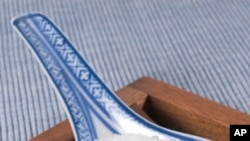A Chinese food giant has offered $1.4 billion to buy one of Australia's biggest sugar companies. The huge bid could reignite concerns about Chinese investment in Australia.
Shanghai's biggest food company, Bright Food Group, is trying to buy the sugar business of CSR, one of Australia's oldest firms.
Bright Food has some powerful and wealthy backers. Its majority shareholder is the Shanghai City government, which would fund any takeover of the Australian company.
Industry experts say that such an acquisition would make sound economic sense, as sugar prices have more doubled in the past year.
CSR has rejected the Chinese offer and it is unclear if Bright Food will return with a sweeter deal to tempt the Australians.
Some analysts believe the move could exacerbate tensions about Chinese investment in Australian firms, amid concerns about foreigners controlling vital and lucrative assets.
China is the third biggest investor in Australia and has recently taken control of coal mines in New South Wales and Queensland. Chinese enterprises also have substantial stakes in minerals heavyweights Rio Tinto and Fortescue Metals.
Mark Causer, a senior investment adviser at Australia's Perspective Group, says that Canberra will always look after national interests first.
"I still think that the Australian government will protect, at all costs, Australian interests," Causer said. "But they will also look at the opportunities that external capital, in this case from China, what it will offer to Australian companies, the Australian public and the Australian shareholders."
In the past year several proposed investments by Chinese companies in Australia have been rejected by the country's Investment Review Board, which oversees foreign acquisitions. This has led to complaints from China that the system is unfair and not transparent.
Late in 2009, the board publicly rebutted those criticisms, stressing that in the previous 18 months it had approved Chinese investments in Australia worth around $30 billion.
During the last year, there were concerns that difficult bilateral diplomatic ties would harm business arrangements between Beijing and Canberra.
Relations soured when Stern Hu, a senior Australian mining executive, was arrested by Chinese officials in July on suspicion of stealing classified commercial information. Tensions worsened when an exiled Uighur leader accused by Beijing of terrorism was allowed to visit Australia.
Despite these political problems, the power of money has kept China and Australia on sound commercial terms.
Trade between these Asia-Pacific partners is now worth $60 billion a year, much of it in favor of Australian mining companies.
Chinese Food Giant Eyes Australian Sugar Maker in Billion-Dollar Offer




